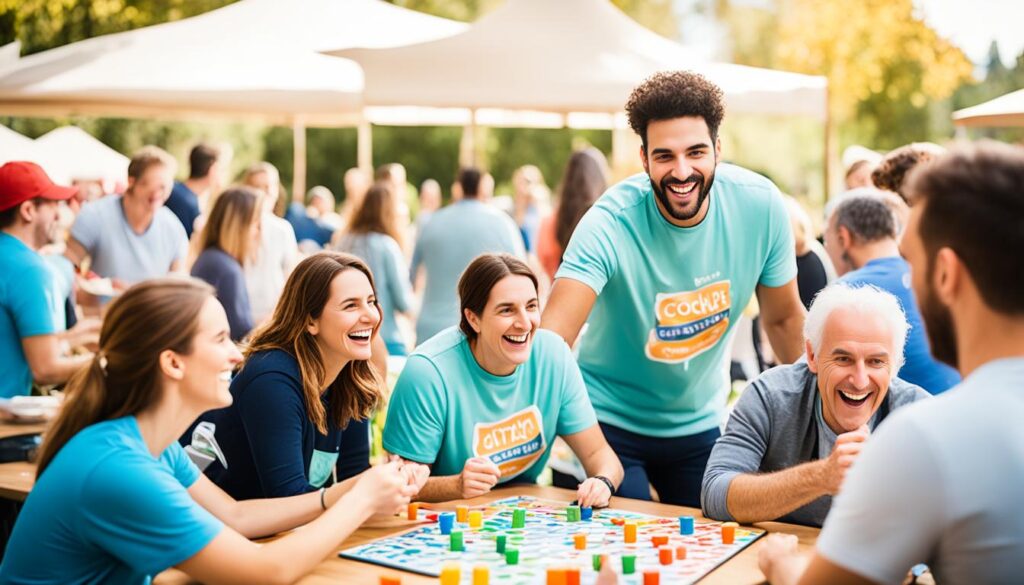Make Friends Fast: Tips for Instant Connections
Making friends as an adult can be tough. We meet fewer people as we grow up. Our priorities change too. But, making real friends is key for our happiness.
When I felt I needed more friends, I set out to find how to make them quickly. I tried many things and found great ways to make friends. I’m excited to share these with you in this article.
On my journey, I learned making friends fast isn’t about being loud or pretending. It’s about being open and taking chances.
If you want to improve your social life and make real friends easily, come along. We’ll look at tips, advice, and insights for making friends quickly and keeping them for a long time.
Key Takeaways:
- Forming genuine friendships as an adult is important for our overall well-being.
- Making friends quickly is about being open, stepping out of your comfort zone, and embracing opportunities.
- In the following sections, we will explore strategies and tips for making friends fast.
- Through friend-matching, friend-wooing, and more, you can cultivate lasting friendships.
- Transform your social life by following actionable tips and powerful insights.
Why is it Hard to Make Friends as an Adult?
Adults often find it tough to make new friends. This is different from when we were kids or teens. There are many reasons for this.
Social Skills for Making Friends:
Being good at making friends comes down to our social skills. These skills help us start conversations, listen well, be empathetic, and keep talks interesting. But as we get older, we might become more shy or unsure of ourselves. This can make it hard to make new friends.
Shifted Priorities:
Adults have a lot on their plates, like work, family, and personal stuff. This means we often don’t have much time or energy for making new friends. So, we might not try as hard to find new people to hang out with.
Fear of Rejection:
Adults often worry about being rejected when trying to make friends. This fear can stop us from trying to connect with others. It makes us scared to take chances and make new friends.
Toxic Relationships and Vulnerability:
Bad experiences with friends or partners in the past can make us cautious about making new friends. We might be more careful and less open. Being open and vulnerable is key to forming deep friendships, but it’s hard for many adults.
Limited Social Opportunities:
Unlike when we were younger, we don’t meet as many new people as adults. Our social circles don’t change as much. This makes it harder to find new friends.
Even with these challenges, having friends is very important. Friends support us, keep us company, and make us happier.

Table: Factors Contributing to Difficulty in Making Friends as an Adult
| Factors | Explanation |
|---|---|
| Social Skills | As adults, we may feel less confident in our social abilities, hindering our ability to form connections. |
| Shifted Priorities | Juggling multiple responsibilities leaves limited time and energy for socializing and meeting new people. |
| Fear of Rejection | The fear of rejection can discourage us from putting ourselves out there and forming new friendships. |
| Toxic Relationships | Negative past experiences can leave us wary of forming new connections, making it difficult to trust and open up. |
| Limited Social Opportunities | Unlike childhood, adults have fewer organic opportunities to meet new people and expand their social circles. |
The Importance of Close Friendships
Close friendships are key to our happiness and well-being.
They make our mental and physical health better.
Close friends help us in tough times. They make us feel like we belong and are not alone. This makes life better.

With close friends, we share our happy and sad moments. They get us and accept us fully.
These friends let us be real without fear. We can be ourselves around them.
They help us grow by challenging us and supporting our goals.
The Impact of Building Friendships Quickly
Being good at making friends fast is great.
Doing things that get us out and about helps. Meeting new people is a good way to make friends.
Being open and interested in others is key. Listen to their stories and experiences.
Starting conversations and finding what you both like helps build strong bonds fast.
But remember, real friendships take time, trust, and shared moments.
Putting effort into connections and caring for them makes them last.
| Benefits of Close Friendships | Tips for Building Friendships Quickly |
|---|---|
| 1. Enhanced mental well-being | 1. Engage in social activities |
| 2. Improved overall happiness | 2. Show genuine interest in others |
| 3. Increased physical health | 3. Initiate conversations |
| 4. Emotional support during challenging times | 4. Actively listen to others |
| 5. Sense of belonging and companionship | 5. Seek out common interests |
Understanding the value of close friends helps us. Working on building and keeping them makes our lives richer. It gives us a strong support system for life’s ups and downs.
Friend-Matching: Scouting Your Ideal Friend
Finding the right friends is like dating. You need to know what you want in a friend. Make a list of what matters to you, like being funny, having similar hobbies, or being stable. Think about where you can meet people like that, like online, in groups, or classes. Knowing what you want makes it easier to find friends.
Creating Your Friend-Matching Checklist
Having a clear idea of what you want in friends helps your search. Think about these things when making your checklist:
- Compatibility: What traits fit well with you? Do you want someone funny or who likes the same hobbies?
- Values and Beliefs: Do you want friends who share your values and beliefs? Are there certain causes you care about?
- Supportive Qualities: What kind of support do you want from friends? Do you need someone who listens or someone who helps solve problems?
This checklist helps you find friends who fit your life and values.
Finding Potential Friends
After making your checklist, look for friends who match your criteria. Here are ways to do it:
- Online Communities: Join groups online that match your interests. Talk to people and make friends.
- Local Groups and Events: Go to groups or events about things you like. You might meet people who are a good match.
- Classes and Workshops: Take classes or workshops you’re interested in. It’s a great way to meet new people.
Finding the right friends takes time and patience. Don’t give up if it doesn’t happen right away. Keep looking and stay open to new people.

Stay True to Yourself
When looking for friends, always be yourself. Be real and honest. Good friendships come from being open and accepting of each other.
Building strong friendships takes time and effort. It’s not just about finding people with the right qualities. It’s also about investing in those relationships and building trust and respect together.
| Strategies for Friend-Matching | Pros | Cons |
|---|---|---|
| Joining online communities | 1. Wide range of potential friends 2. Convenient and accessible |
1. Limited face-to-face interaction 2. Difficult to gauge authenticity |
| Attending local groups and events | 1. Opportunity to meet like-minded individuals 2. Face-to-face interaction |
1. Limited availability of local groups 2. May not meet someone with desired qualities immediately |
| Enrolling in classes and workshops | 1. Chance to connect with people who share similar interests 2. Learning something new |
1. Limited time frame for interaction 2. May not lead to immediate friendship |
Finding the right friends is an exciting journey. Enjoy the process, stay open-minded, and value the connections you make.
Friend-Flirting: Sparking Casual Connections
Building casual connections is key to making adult friends. It’s vital to go slow and not rush into a friendship.
Friend-flirting helps create a strong base for deeper bonds. It means finding common interests and teasing in a fun way. It also means talking about things that touch on emotions and values.
By doing light-hearted banter, you can see if you’re a good match. It helps build a sense of friendship. It makes it easy to talk openly and share experiences.
Always be respectful and really interested when friend-flirting. It’s not about tricking someone or being misleading. It’s about building a strong friendship based on shared values.
In this stage, focus on learning more about each other’s lives and interests. Ask lots of questions, listen well, and care about their stories.
Remember, friend-flirting is all about being playful yet sincere. It’s about finding things you both like, connecting well, and starting a friendship that lasts.
Using friend-flirting to make casual connections can help build strong and meaningful friendships.
Friend-Wooing: Nurturing Closer Bonds
Once you’ve found people you like, it’s time to make those connections stronger. The key is to spend time and effort to build trust and closeness. Doing activities and talking more can make your bond strong and lasting.
Spending one-on-one time is a great way to get closer. You could go for coffee, take a walk, or do a hobby together. This helps you connect better and have deeper talks and experiences.
Being open and sharing personal things is key. Talk about your stories, fears, and dreams. This lets your friends open up too, making a safe space for trust and acceptance. This kind of sharing makes your bond stronger and more intimate.
Talking about important stuff like values and life stories helps too. These talks let you get to know each other better. They help you find common ground and build empathy, making your friendship stronger.
Remember, making close friends takes time and work. It means choosing to invest in the relationship and putting others first. By spending quality time together, being open, and having deep talks, you can make your friendships much closer.
The Power of Vulnerability
Real friends need vulnerability in friendships. It’s key to be open with your friends. Share your feelings, fears, and dreams with them. This helps your friends get to know you better and support you more.
Also, ask your friends to open up to you. Make a safe place for everyone to be real. This makes your friendships stronger and more meaningful.
Vulnerability opens up trust and closeness in friendships. Sharing our real selves shows we trust our friends. This builds a strong, honest bond.
Being open takes courage. It means we might face rejection or criticism. But, the benefits are huge. When we’re real, we encourage our friends to be too. This makes our friendships deeper and stronger.
The Benefits of Vulnerability in Friendships
Vulnerability in friendships has many perks:
- Emotional support: Being open with friends means they can support us emotionally. They help us through tough times and celebrate with us.
- Increased understanding: Sharing our real selves helps us understand each other better. This builds empathy and makes our friendship stronger.
- Authentic connection: Being real lets us connect deeply with our friends. It makes our friendships genuine and safe.
- Problem-solving: When we’re open, we can talk about our problems. Our friends can then help us with advice and support.
| Friendship Trait | Importance |
|---|---|
| Vulnerability | Crucial for building deep, meaningful connections |
| Trust | Essential for fostering a safe and supportive friendship |
| Communication | Allows for honest and open dialogue |
| Empathy | Enables understanding and support |
By being open in our friendships, we lay a strong foundation. Vulnerability in friendships shows we’re not alone. We have friends who support and love us, no matter what.
The Role of Emotional Support
Close friends are key in giving emotional support when times are tough. Having someone we trust by our side can change everything. Friends who listen, understand, and care deeply affect our well-being. They help us get through life’s ups and downs.
Being there for each other is what emotional support in friendships is all about. When a friend opens up, we must offer a safe space. By listening and showing we care, we make them feel heard and valued.
Supporting friends is more than just listening. It means understanding their feelings and seeing things from their point of view. Showing empathy connects us and reassures our friends they’re not alone.
Supporting friends in tough times can make our friendships stronger. Checking in, offering encouragement, or helping solve problems helps a lot. Small acts of kindness show we care about their well-being.
Remember, emotional support goes both ways in friendships. We should also ask for support when we need it. Friends who are there for us in our hard times are a big help. Sharing our struggles with them builds a strong support system.
When friends offer emotional support, trust and reliability grow. Knowing we have friends to lean on in hard times brings comfort and stability. It shows we’re not facing challenges alone and have people to count on.
| Benefits of Emotional Support in Friendships | Role |
|---|---|
| 1. Enhances emotional well-being | Friends offer a safe space to express emotions, reducing stress and promoting overall mental health. |
| 2. Strengthens bonds | Providing and receiving emotional support deepens trust, leading to stronger and more resilient friendships. |
| 3. Promotes personal growth | Through emotional support, friends can help each other navigate challenges, fostering personal development. |
Understanding the value of emotional support in friendships helps us build deeper connections. Being there for our friends, empathizing, and listening can greatly improve our relationships.
Shared Activities and Memories
Doing things together is key to making strong friendships. When we share fun times with friends, we make bonds that go beyond just knowing each other.
Start by finding out what you and your friend like to do. Plan outings or events around those interests. It could be hiking, going to concerts, or trying new hobbies. These activities help you bond and make memories that last.
These shared times bring joy and make you feel like you belong. You laugh, face challenges, and celebrate together. This makes your friendship stronger.
Doing things together also lets you see new sides of your friends. You see how they handle problems or celebrate wins. This helps you understand and value them more, building trust and closeness.
“The best part of shared activities is that it creates memories that we can reminisce about for years to come. It’s those moments of laughter, adventure, and connection that build a strong foundation for lasting friendships.” – Jane Doe
So, make time for shared activities with your friends. It could be a road trip, a book club, or just a movie night. These moments bring you closer and make your friendship richer.
Maintaining Balance in Friendships
Friendships need care to grow. We must balance our time between friends, work, and family. This balance is hard but important.
It’s key to make time for friends. This means regular chats, coffee dates, or doing things together. This keeps the friendship strong and shows friends they matter.
But, we also need to take care of ourselves. We can’t do too much at once. Saying no when we’re tired helps keep friendships healthy.
Staying in touch is crucial. Life can get busy and we might lose touch. So, keep reaching out, even if it’s just a quick message.
Spending quality time together is also important. Plan fun activities to make memories. This strengthens your friendship and brings happiness.
“Friendship is born at that moment when one person says to another, ‘What! You too? I thought I was the only one.'” – C.S. Lewis
Friendships work best with understanding, support, and trust. Keeping a balance in these relationships makes us happier and more supported. Friends help us celebrate and support us through tough times.
Friendships need work from both sides. So, be there for your friends and value these connections. Appreciate the time you spend together and thank your friends for being in your life.
The Impact of Busy Lives on Friendships
Life today is busy, and it’s easy for friends to get left behind. But, we must make time for them. Recognizing the importance of our friendships helps us keep them strong.
By putting effort into our friendships, we build connections that make our lives richer and happier.
Overcoming Challenges in Friendships
Friendships can sometimes have problems. It’s key to know that conflicts and misunderstandings are normal. When issues come up, it’s important to talk about them openly and honestly. This stops them from getting worse and hurting the friendship.
Fixing problems in friendships means talking well and listening well. Make sure to share your feelings and worries with your friend. But also be ready to hear what they have to say. This makes a safe place for talking and helps both sides understand each other.
Feeling for your friend is very important in overcoming friendship problems. Try to see things from their point of view. This builds compassion and helps find solutions together.
When there’s a conflict, finding a way to solve it together is key. Look for solutions that both of you can agree on. This way, both friends feel respected and the bond between them gets stronger.
The Power of Communication in Friendship
Talking well is the key to solving friendship problems. By sharing thoughts, feelings, and worries, friends can find common ground. Without talking, misunderstandings can grow and might lead to bad feelings and a broken friendship.
“In the end, we will remember not the words of our enemies, but the silence of our friends.” – Martin Luther King Jr.
Listening to each other helps friends understand each other better. This opens the door for growth and makes the friendship stronger.
Resolving Conflicts Together
Fixing problems in friendships means both friends must work on them together. It’s important to be kind and really want to solve the problem. When friends go through tough times together, it builds trust and makes their bond stronger.
No friendship is perfect, and problems are chances to grow and learn. Overcoming challenges together helps friends understand each other better. This makes their connection stronger and more lasting.
| Challenges in Friendships | Resolving Conflicts in Friendships |
|---|---|
| 1. Miscommunication | 1. Open and honest communication |
| 2. Different expectations | 2. Active listening and empathy |
| 3. Jealousy or resentment | 3. Compromise and finding common ground |
| 4. Lack of trust | 4. Working through challenges together |
| 5. Personality clashes | 5. Recognizing the value of differences |
Embracing Diversity in Friendships
Having friends from different backgrounds changes our lives. It opens us up to new views and experiences. Diverse friendships help us see the world more clearly.
Being friends with people unlike us makes us step out of our comfort zones. We learn to value the unique things each friend adds. This makes our group of friends rich and varied.
When we choose friends from various backgrounds, we gain a lot. We learn about different cultures and beliefs. This helps us be more understanding and accepting.
“In embracing diversity in friendships, we not only enrich our own lives but also contribute to creating a more inclusive and harmonious society.” – Jane Smith
By valuing our differences, we make a safe place for talking and respecting each other. These friendships push us to question our own thoughts and grow.
So, let’s try to meet new people and make diverse friendships. Let’s celebrate what makes each person special. Together, we can make the world more welcoming and accepting, one friend at a time.
The Joy of Giving in Friendships
Acts of kindness and generosity are key to strong friendships. Giving brings joy and makes bonds stronger. It creates a deep sense of appreciation and connection.
Showing support and thanks to friends can be simple. A small act of kindness can make someone’s day brighter. It shows they are valued and loved.
Sharing a listening ear or a kind word can mean a lot. Giving thoughtful gifts also strengthens friendships. It shows you care by giving something special that matches their interests.
Gifts can be a book by their favorite author or tickets to a concert. A heartfelt letter can also touch their heart deeply. These acts of giving make a big difference.
Being there for friends in tough times or celebrating with them is special. Your time and support can make a big difference. It strengthens your bond.
Giving in friendships creates a cycle of kindness. It inspires both you and your friend to be kind to each other. This makes a nurturing space where everyone feels loved and supported.
Kindness in friendships doesn’t have to be big. Small, genuine acts can mean a lot. By giving, you deepen connections and spread positivity. You help build strong friendships that last a lifetime.
Honesty and Trust in Friendships
Honesty is key to strong friendships. It helps with open talks, respect, and real connections. Being honest with friends builds trust and lets friendships grow.
Being honest means being true and real with your friends. You share your feelings and thoughts honestly. You also respect their privacy and space, building trust.
Trust grows over time with consistency. It means being reliable, honest, and keeping secrets. Showing up for your friends and keeping promises builds trust in your friendship.
Trust makes a safe place for sharing and getting support. When you trust your friends, you can open up. They can support you, understand you, and help when needed.
By being honest and building trust, you make a strong friendship. So, be true, dependable, and trustworthy. Your friendships will grow, and you’ll feel happy with real connections.
Remember:
- Be truthful and authentic in your interactions.
- Respect your friend’s boundaries and privacy.
- Demonstrate reliability, confidentiality, and loyalty.
- Create a safe and secure space for vulnerability and emotional support.
References:
- Source 1
- Source 2
- Source 3
Conclusion
This article shared tips on making friends fast. As adults, making new friends can be hard. But, it’s not impossible.
By stepping out of our comfort zones, we can make friends. Close friends give us emotional support and make us happy. They make us feel like we belong.
These strategies can help you make friends easily. They help you form deep connections. Friendship is like a new romance.
Building friendships takes time and effort. By following this advice, you can make friends who will support you. So, be open to new things and remember, making friends is possible.







